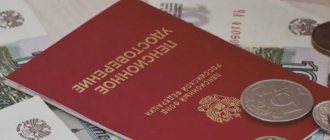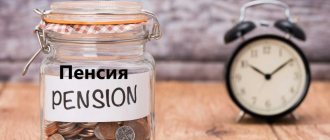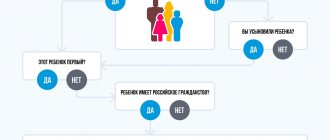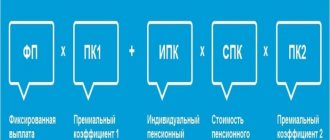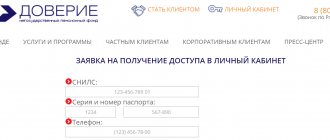The Federation of Independent Trade Unions of Russia (FNPR) sent a letter Prime Minister Mikhail Mishustin with a proposal to cancel the funded part of the pension. The text of the letter is posted on the federation website.
The document states that the FNPR consistently advocates excluding the funded component from the state compulsory pension insurance system. But this issue has not been resolved and, according to trade unions, “leads to legal conflicts.”
Questions and answers How will the procedure for receiving pensions and benefits on the card change from October 1?
Temporary measure turned into permanent
Let me remind you that the Russian government first froze the funded part of pensions in 2014.
Until this moment, citizens born in 1967 and later, who formed a funded pension through monthly contributions from employers, could independently manage these contributions, directing the money to form their own savings or transferring them to the insurance part.
After the freeze, contributions to the funded part of the pension system in the amount of 6% of Russians’ wages began to be directed to the insurance part, that is, to go towards payments to current pensioners.
The freezing of the funded part of the pension in 2014 was initially announced by the government as a temporary measure. However, then the authorities extended this moratorium several times. And the other day the government introduced a bill to the State Duma on another extension of the freeze until 2023.
A temporary measure, like everything temporary, has become permanent.
How can I get pension savings?
You can apply for a funded pension at any time after the right to it arises: upon reaching 55 years of age for women and 60 years of age for men. To do this, you need to have the minimum number of required pension points and length of service: in 2020 this is 18.6 points and 11 years, respectively.
The payment can be assigned either simultaneously with the insurance pension or separately. Pension savings can be paid in three ways. The first is a lifetime monthly funded pension, the amount of which is calculated based on the expected payment period. The second is in the form of a lump sum payment, which can be applied for every five years (issued provided that the size of the funded part is less than 5% of the amount of the pension received). The third method is to receive an urgent payment, when savings are paid within the time specified by the recipient in the application (but not less than 120 months).
Savings for future retirees
Contributions to the Pension Fund for the employer now amount to 22%, of which 6% is the funded component, which by law should not go towards joint payment of pension benefits. This 6% should be used to form individual savings for payments in old age. But the government takes this 6% from Russians and uses it to pay current pensions.
The bill explicitly states the goal of a “moratorium on the use of savings.” This will allow our authorities to “significantly reduce” the transfer to cover the Pension Fund deficit, which currently amounts to about 40%.
Legislators even calculated budget savings due to this moratorium. The explanatory note states that in “the next three years, at the expense of citizens’ pension savings, the budget will save 669.3 billion rubles.”
Also in the explanatory note, the authorities claim that this decision “will not reduce the volume of pension rights of insured persons in the compulsory pension insurance system,” and also “will not entail negative socio-economic, financial and other consequences.”
Here, apparently, it is implied that the Russians will once again remain silent in response to the arbitrariness of the authorities.
What is meant by “freezing pension savings”?
In this case, “freezing” means suspending the rules according to which, from the insurance contributions paid by employers, funds previously allocated for the formation of a funded pension are now used to finance the insurance pension. This occurs at the expense of funds that make up the individual part of the insurance premium tariff. That is, in essence, a freeze is a temporary cessation of the formation of a funded pension to save funds from the federal budget.
According to the authors of the “freeze law,” its implementation will lead to a reduction in the burden on the budget in the amount of 551.3 billion by 2020, since budget funds will not have to finance the Pension Fund of the Russian Federation and provide a system of compulsory pension insurance. Thus, at the expense of citizens’ money allocated to increase future pensions, pressing budget problems are solved in terms of financing the insurance pension currently paid.
Trade unions called for the abolition of the funded part of pensions
Many analysts criticize the injustice of the existing pension insurance system. So-called “savings contributions” in the amount of 6% are currently mandatory, but these contributions do not go towards accumulating a future pension, but are paid to current pensioners. And this will lead to future retirees losing part of their future pension.
Rather than “freezing” savings from year to year, it is better to immediately remove them from the legal field. Many experts think so. From the perspective of future retirees, this would be fair.
On September 30, the chairman of the Federation of Independent Trade Unions of Russia (FNPR), Mikhail Shmakov, turned to Prime Minister Mikhail Mishustin with the initiative to cancel the funded part of the pension.
“FNPR has repeatedly expressed its position on the need to legislatively remove the funded component from the state compulsory pension insurance system,” says Mikhail Shmakov’s letter to Mikhail Mishustin.
The very idea of a funded pension, that is, additional opportunities to accumulate funds during your working life, is, in my opinion, good. And it is being successfully implemented in many countries around the world. But what has this idea turned into here in Russia? As always, with good intentions, we are once again taking money from the population.
The pension system in our country, to which the authorities regularly make changes, adjusting it to their immediate needs, has long ceased to fulfill its main function and task - providing our elderly with a dignified old age. And, in my opinion, it needs to be completely changed. Otherwise, we, future pensioners, risk being left without pensions altogether.
On what basis and until what year was the freeze on pension savings extended?
The so-called “freeze of pension savings” has been successively extended since 2014 on the basis of the following regulations:
- in 2014 - Federal Law of December 4, 2013 N 351-FZ;
- in 2020 - Federal Law dated December 1, 2014 N 410-FZ;
- in 2020 - Federal Law dated December 14, 2015 N 373-FZ;
- in 2017-2019 — Federal Law of December 19, 2016 N 447-FZ.
From January 1, 2020, a rule comes into force according to which the freeze on pensions is extended until 2020. It was introduced by Federal Law No. 413-FZ of December 20, 2017 “On Amendments to Article 33.3 of the Federal Law “On Compulsory Pension Insurance in the Russian Federation” and Article 6.1 of the Federal Law “On Amendments to Certain Legislative Acts of the Russian Federation on Compulsory Pension Insurance Issues” regarding the right of insured persons to choose a pension option."
What will happen to the funds?
According to Deputy Minister of Labor Andrei Pudov, the accumulated pension funds have not gone away after the adoption of the moratorium law. People who will retire soon will be able to receive this money.
We talked about whether it is possible to withdraw the funded portion before retirement, in a separate article, and you can find out whether working pensioners can apply for it here.
The freeze does not reduce the pension rights of citizens and does not mean the abolition of the funded system. It turns out that the 6% that the employer contributed monthly to the non-state pension fund, as well as investment income from these contributions, still remains with the owner of the pension account.
In their opinion, during the moratorium, citizens will not lose the funds that formed the monthly savings part, but will lose the projected investment income from them.
It turns out that the state guarantees the return of the funded part, but does not compensate for the loss of possible investment income that citizens would receive by keeping their savings in partner banks of the Pension Fund of the Russian Federation and Non-State Pension Funds.
Those Russians who retire have the right to return their savings in several ways:
- One-time payment . It can be received by disabled people, pensioners, as well as citizens whose savings amount is less than 5% of their old-age pension.
- Urgent payment for 10 years . Reliable to those who formed a pension through voluntary contributions.
- Lifetime. Assigned if the amount of savings is more than 5% in relation to the amount of old-age payments.
- By inheritance. Entitled to the relatives of the deceased owner of the personal account by law or will. Paid in one lump sum. We tell you more about whether and how to receive the funded part of the deceased’s pension here.
Despite the temporary abolition of this system, citizens have the opportunity to increase material security in the future using the co-financing program . You can become a participant in this program until December 31, 2020.
Such a system, unlike a funded system, involves independently depositing money from your personal budget.
The moratorium entailed a number of consequences: an increase in interest rates on loans for the population, an unstable situation in the work of non-state pension funds, as well as the loss of possible investment income by citizens. Nevertheless, the current moratorium does not deprive citizens of the right to receive pensions, including the funded part (read about payments under the funded part here).
The future of the savings system
The moratorium will no longer be lifted, since the pension savings system has shown itself to be insolvent. Already in 2014, the development of a new program began that could replace it.
Thus the IPC system was born. It implies that a person decides for himself how much and for how long to save for a future pension.
Its launch was scheduled for 2020, but due to the new reform regarding raising the retirement age, it was decided to postpone the innovations until 2020. Starting this year, people will be able to open an IPC account and deposit as much money as they wish.
The state will be able to help citizens create savings using tax deduction amounts (including social). Employers will also be able to take part in increasing the pension capital of their employees, in return receiving some benefits from the state.
Those who have accumulated savings by this time will be able to transfer them to the new system. The funds will be paid in the form of an additional pension. In some cases, the account holder will be able to receive the money before a certain age. At the same time, each participant in the new program will be able to leave it if they wish.
Should we be afraid?
Government officials assure us that funds are not being withdrawn from circulation, as many incompetent individuals believe. It is also persistently stated that a complete abolition of the funded share of pensions will not occur, and funds that have been frozen in pension savings will be transferred to the accounts of non-state funds after the moratorium is lifted. The only question is when this will happen. However, the government guarantees this fact. So, when calculating your pension, the money accumulated during the freezing of pension savings will be indexed and taken into account.
conclusions
It is unknown when contributions that were frozen in pension savings will be transferred to NPFs again. It is also unclear whether they will, in principle, be transferred anywhere.
Extending the moratorium until 2020 also does not increase citizens’ trust in the government. The introduced restrictions also create problems in the domestic financial market, since access to external resources is difficult. This is due to the fact that non-state pension funds and management companies invest exclusively in the domestic market.
The introduction of the moratorium significantly reduced the investment activity of funds, which in the future will inevitably affect interest rates on loans for both individuals and legal entities, and not for the better. Such increases will slow down the development of industry, which is already not in the best position at the moment. This will be followed by a reduction in wages and the number of jobs, and therefore in revenues to the Pension Fund budget.
Amount of future payments
Naturally, future pensioners are very concerned about the question of whether the moratorium will affect the funded part of the pension in future payments. The obvious fact is that such restrictions will affect future pensions. This is due to several factors:
1. Before the introduction of restrictions, contributions to the funded part of the pension were placed by non-state pension funds and management companies in the financial markets, and were also invested in profitable enterprises and projects. This, naturally, increased savings and, accordingly, the size of the future pension.
2. The return on investment is influenced by many factors, including the professionalism of NPF employees. However, many funds show stable growth in all indicators, unlike the Pension Fund.
Why did you freeze it?
As mentioned earlier, the moratorium on the funded part of the pension was imposed due to the state’s need to generate additional income. Previously, defrauded investors decided to transfer the savings portion to non-state companies.
Now the amount is used to provide insurance benefits and other government needs. Another reason for suspending the program for forming the funded part of the pension is the planned indexation of payments for existing pensioners.
Expert opinion
Kurtov Mikhail Sergeevich
Practitioner lawyer with 15 years of experience. Specializes in civil and family law. Author of dozens of articles on legal topics.
The Russian government is trying to bring average monthly pensions closer to European standards. As a result, citizens will not be able to save on food, clothing and other needs.
